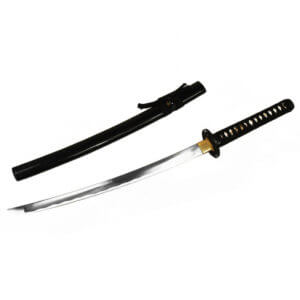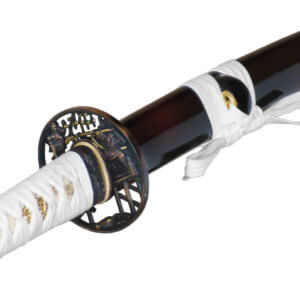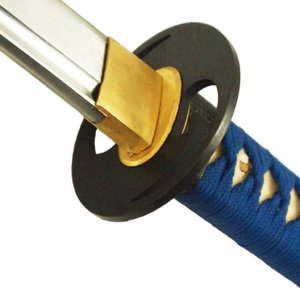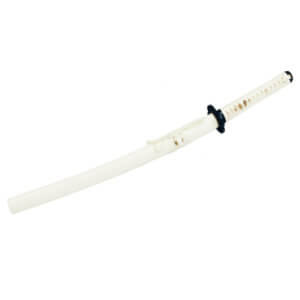To maintain the condition of a samurai sword, continuous sword care is essential (you can find our sword care instructions here). Swords with stainless steel blades are an exception; the reason why this is not necessarily used for swords is explained in more detail below. here explained. The following applies to all other blades: To keep moisture away from the blade, sword oil should be applied to the blade regularly. This applies in particular if the sword is used as part of Tameshigiri-The blade is actively used during the exercises, as the mats used are usually soaked and therefore transfer moisture to the blade.
Knives usually have the same blade oil requirements as swords. However, knives are of course primarily used as kitchen knives in the household. This means that they often come into contact with water and acidic foods. With regular use, this combination means that these blades do not rust. However, for the sake of the steel, these blades should still be oiled from time to time, especially if they are not used for long periods.
There are many "insider tips" about alternative solutions circulating on the internet, from users who have allegedly been using oil XY for years, claiming that it is ideal for sword care and much cheaper. Beware of such advice! In this article, we explain the solutions that are often mentioned and why they are wrong.
Spoilt for choice
The market offers a very wide range of different oils and waxes for blade care. In the first step, we would like to introduce the various substances before making a personal recommendation. We divide them into
- Plant-based oils
- Industrial oils that are not primarily intended for sword care
- and waxes
Plant-based heavy oils
Japanese sword oil is also commonly referred to as choji. The name actually stands for clove oil, but is also frequently used for other oils. However, the quality of the choji on offer can vary greatly. Plant oils can be extracted from various parts of a plant, such as the seeds, leaves or flowers. There are also different methods for extracting the oil with different results.
This results in oils of completely different quality. That's why not all clove oils are the same! Here we present two typical oils that are extracted from plants. However, this does not mean that every oil obtained from these plants is also suitable for sword care.
Tsubaki Abura (ツバキ油) - camellia oil
This oil is extracted from the camellia plant. The original sword oil produced in Japan undergoes a process to obtain a pure oil for sword care. Camellia oils produced in Europe, on the other hand, often contain components that are not desirable for blade care.
Choji Abura (チョウジ油) - clove oil
Clove oil should also be an oil without undesirable components. Clove oil is usually not pure clove oil, but a mixture of various high-quality, resin-free and acid-free vegetable oils. It has a high penetrating ability and therefore gets into even the smallest scratches on the blade. It infiltrates the rust, dissolves it and prevents the formation of new rust with a thin and secure protective film.
"Insider tip": Vegetable oil from the pharmacy or cooking oil?
Plant oils from the pharmacy are usually essential oils. Using these for blade care is one of the worst things you can do to a blade. The oil itself evaporates, which can dissolve components of the blade steel. Once it has evaporated, the blade is then completely without protection.
Edible oil is primarily designed for human consumption. It has a more or less high proportion of acids that are well tolerated by the human organism. However, these acids have a negative effect on steel, which is why vegetable oils for cooking are not suitable for sword care.
Industrial oils
In addition to the classic plant-based oils, some people also like to use cheaper alternatives. Most of these were not developed for sword care. We would like to mention a few here. Under no circumstances should oils containing ammonia or similar substances be used, such as some machine oils or vegetable fats, as their components attack steel.
Ballistol / gun oil / pistol oil
Ballistol is a gun oil that was originally developed by Friedrich Wilhelm Klever. It is the best-known gun care oil in Germany. According to the manufacturer, it has a slightly oxidising effect on contact with brass or copper, which is why it should not be used to preserve these metals.
Samurai swords consist of some components, such as the Habakibut usually made of brass or copper.
Other oils developed for the care of firearms are also not ideal for the care of a sword blade. They do not damage the blade, but do not offer the perfect properties either. The odour of these oils often takes some getting used to.
Machine oil / sewing machine oil
These names usually stand for technical white oil. These are refined, colourless to slightly yellowish mineral oils. In contrast to medical white oil, technical white oil contains a proportion of aromatic hydrocarbons, which are suspected of being carcinogenic. Of course, this has no negative effects on the blade, but should be taken into account when using it. It serves as a lubricant and corrosion protection. Due to its composition, this oil should only be used in well-ventilated areas.
WD-40
WD-40 is a penetrating oil and was developed as an agent for water displacement and corrosion protection. It consists mainly of petrol and mineral oil. WD-40 or its German competitor Caramba is available in almost every household, which is why some people use it as a cheap substitute for real sword oil.
However, applying oil with a spray bottle is difficult because it is designed to transport oil deep into cracks and there is corresponding pressure on the bottle. When maintaining the blade, a large proportion of the oil quickly ends up next to the blade or you spray far too much oil onto the blade.
"May cause drowsiness and dizziness" is the first sentence of the warning on the bottle. If you use the oil in a closed room, you soon realise that this is no exaggeration. WD-40 is a good product for eliminating door squeaks. It also provides very good rust protection. However, it comes into direct contact with people when maintaining the centreboard and can quickly have a negative effect on health. We therefore do not recommend it for centreboard maintenance.
"Insider tip": Engine oil?
Engine oils contain all kinds of additives that make this oil perfect for the conditions inside an engine. High mechanical loads and high temperatures are no problem for these oils. However, these properties are not relevant for blade care and the additives in the engine oil sometimes damage the steel of the blade.
Oils from petroleum and petroleum distillate
There are several manufacturers on the market who offer heavy oils based on petroleum or petroleum distillate. The use of this oil leads to headaches and dizziness after a very short time of inhalation. We do not know how harmful it really is. But this oil cannot be healthy. That is why we do not discuss this oil at all in our article and clearly advise against using it!
Waxes
Waxes are used for long-term protection of the sword blade. They are particularly popular with collectors of historical swords.
Renaissance Wax
Is the standard among waxes. Renaissance wax was developed in the 1950s in the laboratories of the British National Museum in order to preserve the treasures stored there in the best possible way. Due to its microcrystalline structure, it is much finer than other waxes, which means it protects the blade better against moisture. It is also completely pH-neutral. During development, the focus was on the long-term protection of historical weapons, which is why it is ideal for protecting swords from rust in the long term. Over the years, it has become firmly established in the international museum world.
Conclusion after extensive testing
We found the topic so interesting that, after writing this article, we bought and tried out every possible sword oil on the market.
Of course, we don't want to withhold the results from you:
The yield of the Plant-based oils was very mixed. Many oils were a real disaster because they contained far too many essential components and the blade was left without protection after a very short time. None of the oils, which consist entirely of plant oil, had a good and long-lasting protective effect. They also became rancid relatively quickly.
However, some oils sold as vegetable oils have performed significantly better than the others. This naturally aroused our interest and we analysed these oils in more detail. The sobering result was that most of these oils consisted of the cheapest industrial oil and were sold as vegetable oil at completely overpriced prices!
With industrial oils There were many that had a good protective effect. However, it quickly became clear that most of these oils are not intended for sword care. From a disgusting odour to harmfulness and carcinogenic ingredients, there was everything you could wish for.
We were so amazed by the result that we decided to develop our own sword oil and offer it under the Toshiro Swords brand. The sword oil from Toshiro Swords is acid-free, gliding, creeping, non-resinous and non-volatile. It has a pleasant odour and consists of ingredients such as medicinal white oil and high-quality camellia and clove oil. No harmful substances such as petroleum or industrial oil have been deliberately used. And the best thing about it: it is relatively inexpensive for its high quality.
The sword oil is now available for purchase in our shop.






